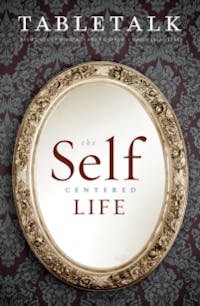
Request your free, three-month trial to Tabletalk magazine. You’ll receive the print issue monthly and gain immediate digital access to decades of archives. This trial is risk-free. No credit card required.
Try Tabletalk NowAlready receive Tabletalk magazine every month?
Verify your email address to gain unlimited access.
The last Saturday in October is perhaps my favorite day of the year. The Southwest Virginia church I served for more than a dozen years has a grand celebration every year on that day. The people celebrate the grace of God in bringing us the Reformation, which began October 31, 1517, when Martin Luther nailed his Ninety-Five Theses on the church door in Wittenberg. The celebration includes a telling of the story of Martin Luther to the children around a bonfire with s’mores. (I told the story when we lived there.) It includes contests in cooking chili and in cooking pies. It includes a grand street fair, with fresh fried doughnuts, barbeque, and hot french fries. All Ninety-Five of the theses are recited. Children and adults sing and play their instruments. And as the day draws to a close, the people dance. They dance with each other. They dance before the watching world. Most of all, they dance for the pleasure of our King and Redeemer. It’s a wonderful day, celebrating a glorious gospel.
On the last Saturday in October 2011, however, I was not at our Reformation celebration. I was not in the mountains watching the fall leaves float to the ground. I was not eating funnel cake or serving as a judge in the chili contest (a perk of winning in the past). I was, instead, in hot and muggy Orlando, surrounded by concrete. I was sitting in the hospital with my dear wife as she received a blood transfusion, part of her continuing treatment in her battle with leukemia.
One could argue that here we had evidence of the work of Christ in my life. I did not, after all, choose the crassly selfish thing. I did not kiss my wife on the cheek and wish her the best on my way out the door for a quick trip to Virginia. The truth is, however, that there is no place I would have rather been, but I moved my family from beauty and friends in Virginia to a crowded city out of a certain kind of selfishness. And I sat in that hospital room out of that same kind of selfishness.
In the Sermon on the Mount, Jesus warns us against a grasping, fearful perspective on life. We tend to chase wealth, acclaim, and comfort, thinking only of ourselves. That Jesus condemns this perspective does not surprise us. How He does so, however, ought to stun us. His argument in this most famous sermon (and elsewhere) is not that we should give up on all the joy, peace, happiness, and satisfaction we would have if we were to be blessed to acquire wealth, acclaim, and comfort. Instead, out of gratitude for our eternal salvation, Jesus teaches that we must not seek these things first, but instead pursue our one duty.
Our redemption is indeed glorious enough that it ought to push us to be willing to set aside our own interests and pursue the greater good of the kingdom. Even those who are unredeemed owe Him everything. How much more, then, do we who are redeemed owe Him? Jesus, however, argues that instead of giving up our own interests, we ought to pursue those interests with wisdom. We don’t change the end, but the means.
Consider first my move to Florida. My earthly father asked me to move to Orlando. My heavenly Father tells me that the way to have a good life, the strategy for having it go well for me, is to honor my father and mother. The calculus, then, was rather simple. The same was true on this particular day. Would I rather be at a Reformation celebration than in the hospital? Of course. However, would I rather be with my wife or with my friends in Virginia? With my wife, of course. Whatever the circumstances, the one place I most want to be is with my wife.
We are called not to seek self but to seek first the kingdom of God. We are told, however, not just that when we do this, all these things, the silly things we worry about, will be added to us. We are told also that there we will find life abundant. There we will find, at the right hand of the King of this kingdom, pleasures forevermore (Ps. 16:11). The world promises us that if we will just seek it, we can be kings. Because He has already secured it, the King promises us the world.
When we moved to Florida, I reminded my children that all that we enjoyed in Virginia was by the grace of God and that the grace of God extends to Florida. It also extends into hospital rooms. His grace extends as far as the ends of His kingdom. And remember this: we are called to seek that kingdom, not to expand it. We seek, we serve, we pursue, and we promote, but we do not grow the kingdom. He reigns everywhere right now. His rule cannot be extended because He rules wherever there is a there. And there He showers us with His goodness.
We don’t, therefore, need to seek things. We already have everything. We don’t need to seek self. When we lost it, He found it. What we need instead is to rejoice, to give thanks, to ask that He would not give us more, save for a deeper gratitude for all that He has already given us.
